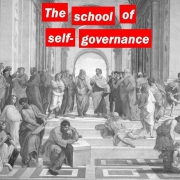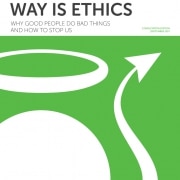Featured Collaborator for February: Steven Blader
Interview with Steven Blader, associate professor of Management and Organizations at NYU’s Stern School of Business.

What are your main areas of research?
My primary areas of research focus on the psychological dynamics that relate to
- justice,
- status and hierarchy, and
- the role that groups play in how people think and feel about themselves.
As a social psychologist on the faculty of a business school, my research tends to investigate these topics in ways that are particularly insightful for understanding organizational contexts. And indeed, over the years I have become more and more convinced that the psychological dynamics of justice, status, and identity are central to achieving a deep and robust understanding of organizations and organizational life. That is, I see these social psychological issues for both organizational scholarship as well more practical efforts to make organizations more productive, ethical, and satisfying to their members. See our research page on Fairness, created and curated by Steven Blader.
Can fairness motivate ethical decision making or do most people look out for fairness as a one way street: to ensure they are treated like they imagine they deserve to be.
There is an extraordinary amount of evidence that people’s concern about fairness is much more than simply a tool they may use to help them get what they feel they deserve or want.
For instance, we often see people defining and evaluating fairness independently of their outcome concerns; reacting more strongly to fairness than to their self-interest; and evaluating and reacting to fairness even as third parties to an encounter and thus when their own outcomes are not involved.
These and other findings confirm to us that people’s concern about fairness is genuine, distinct, and pervasive. As such, fairness can absolutely provide a route to enhancing ethicality in both one’s own, as well as other’s, decision making. That said, there are factors that make the picture more complicated, factors that must be considered when turning to fairness as a route to enhancing ethicality.
How does your work on ethical decision making help companies that want to improve themselves as ethical systems?
There are many insights from my work that speak to this issue. However, I think that perhaps the primary insight and recommendation is that companies should focus on the procedures and decision making processes, both big and small, within an organization. Do these procedures accord with the company’s ethical values? Are procedures designed to ensure that decisions are made thoughtfully, based on accurate information, and without bias? Do the company’s procedures send a message to employees that they are included, respected, and valued by the organization? Does leadership throughout the organization support the procedures that are designed around these principles? Finally, are employees given enough information about how decisions get made so that they can accurately evaluate whether these principles and practices are being followed.
Ensuring that these characteristics define a company’s formal procedures, as well as the processes and norms that guide informal interactions and everyday decisions, is important because they facilitate both the reality and the sense that outcomes are fair. Fair outcomes may emerge by following some, but not all, of these principles and practices. For instance, taking great care to get accurate information when making a decision, and to evaluate and weight that information in an unbiased manner, may alone led to a fair outcome.
But if employees’ views are not solicited and heard during that process, if the explanation for the process is not clear and thorough, and if decision’s impact on employees is not sufficiently acknowledged, then the company is not doing everything possible to create an ethical system. First, it is less likely that the outcome will be seen as fair, even if it is quite fair. Second, beyond the specifics of the decision or outcome, these elements of a company’s formal and informal processes send a signal to employees about the company’s values and identity; and motivate involvement by employees that encourages them, among other things, to be a part of ensuring the ethicality of the organization. So creating an ethical culture is not just about ensuring that decisions themselves are fair and ethical, but that they are made in ways that will foster a culture of fairness and ethics more broadly.
If you could only highlight one paper or research finding (or piece of work that you’ve been involved with) that relates to Ethical Systems which one would it be and why?
I am particularly excited about my ongoing research on the psychology of status. Status, or the amount of respect and esteem than an individual has in the eyes of others, is an important basis for hierarchical differentiation in any group or organization. That is, people within any group or organization quite naturally become distinguished from one another and ultimately rank-ordered according to the amount of status they have. Yet status and status hierarchies have not received due attention in research. This is because status has typically been conceptualized and examined in ways that either see it as equivalent to, or confounded with, other factors such as power, wealth, influence, control, formal rank, etc. While status may be correlated with these other factors, it is distinct. More importantly, we find that it can have dramatically distinct effects on a range of outcomes that matter for creating more ethical systems. For instance, my research shows that status can enhance the fairness of one’s treatment towards others and the likelihood of adopting others’ perspectives. These effects are the precise opposite of what we find for other hierarchical bases such as power and wealth.
Since fairness and perspective taking are foundations on which ethical systems rely, this line of research suggests some important and novel ways for creating such systems. Consider, for instance, the ways in which leadership positions are typically framed. In most organizations, these positions are framed in terms of control, budget, headcount, influence, etc. As such, the people holding these positions are focused on these factors. Less often are these positions framed in ways that orient leaders to focus on the amount of respect and admiration that others have for them. Yet my research suggests that getting leaders to focus and value on the respect that others have for them, as leaders, would go a long way in making those individuals more ethical and in creating more ethical organizations.
How did you first get interested in your field?
I have always been fascinated by the psychology of social interactions. Literally, for as long as I can remember, these types of issues always captured by attention.
If you could only give one piece of advice to companies, what would it be?
To institute procedures that are more transparent and inclusive.
If you could only give one piece of advice to individuals, what would it be?
To recognize the importance of treating other fairly, and more generally to be sensitive to the experience that you create for others in your interactions with them. Too often, we are focused on “reading” others, without sufficiently recognizing that we play a key role in determining others’ behaviors and orientation towards us.
Featured Video
Our YouTube playlist on Fairness
Featured Academic Article
“Fairness lies in the heart of the beholder: How the social emotions of third parties influence reactions to injustice,” article in Organizational Behavior & Human Decision Processes (2013).
Featured Popular Article
When data dooms your company, USA Today, June 1, 2015









